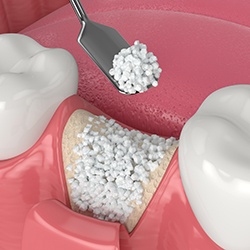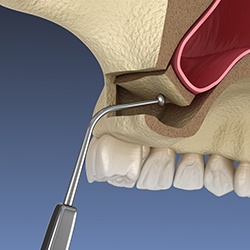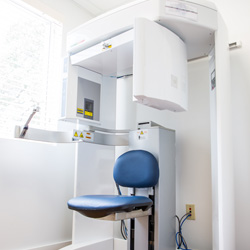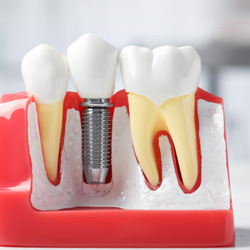Dental Implants — Jupiter, FL
Tooth Replacement for the 21st Century

In the past, if you had a missing tooth, a dentist would give you a restoration that only brought back the dental crown or visible part of the tooth. While this might have looked great, it was inevitably weaker than your real tooth, and you would likely have to get it replaced in less than a decade. Dental implants fix this problem by replacing both the crown and the root located below the gum line. As a result, a patient basically gets their real tooth back and enjoys the very best when it comes to both aesthetics and function. At Jupiter Implant & Cosmetic Dentistry, we can use this state-of-the-art treatment to replace any number of teeth for a lifetime, and you can get started rebuilding your smile by calling us today to schedule a consultation.
Why Choose Jupiter Implant and Cosmetic Dentistry for Dental Implants?
- Entire Dental Procedure Performed by Experts In-House
- Make Your Dental Prosthesis More Solid and Reliable
- Dental Restorations Custom-Designed for Every Patient
What Are Dental Implants?

Dental implants are a form of tooth replacement that has quickly become the gold standard for addressing tooth loss. It’s important to keep in mind that they are by far the best long-term option because of the surgical aspects that go into treatment. Once the implant is placed inside of the jaw and a restoration is attached, you can expect lasting benefits that simply aren’t possible with bridges and dentures because they don’t go far enough. For example, the implant’s ability to stimulate the bone keeps the jaw strong and retains more bone structure, which offers many benefits to your short- and long-term oral health and quality of life.
Start-to-Finish Convenience

Our dental office literally has “implant” in its name, and that’s because unlike other offices, we won’t send you running between different doctors to complete the dental implant procedure. Doctors Shane and Amiee Vaughn are able to perform the entire procedure themselves thanks to their advanced training and experience. From your initial consultation all the way until you leave our office with your new smile, you’ll work with the same expert team you know and trust, saving you time, money, and stress every step of the way.
The 4 Step Dental Implant Process

Understanding how dental implants work is rather straightforward. That’s because they are built so much like your natural teeth. First, a dentist in Jupiter sets the implant post in your jawbone. This replaces the root of your missing tooth. Then, a small abutment connects the implant to the tooth restoration. Once the post, abutment and restoration are in place, you have a lifelike tooth replacement to complete your smile. Continue reading for more details about the dental implant process.
Initial Consultation

The dental implant process begins with a consultation between you and Dr. Vaughn. Together you will discuss different tooth replacement options and what you can expect if you choose dental implants. Implant surgery and recovery will be explained, and our front office team will prepare an estimate of the cost.
Next, a treatment plan is developed based on a thorough oral examination. Dr. Vaughn will examine your gums and the teeth surrounding the space in your smile as well as your facial features and jaw structure.
Dental Implant Surgery

While dental implant surgery may sound intimidating, most of our patients are pleasantly surprised by how easy and stress-free it is. First, a local anesthetic is administered to numb the site. You may feel some pressure, but there won’t be pain. An incision in your gums reveals the bone beneath your missing tooth. Then, a small section of bone and the implant is surgically inserted. Over the course of the next few months your gums will heal.
Osseointegration & Abutment Placement

As your gums heal, a lot is happening below the surface. The implant and surrounding bone tissue bond in a process called osseointegration. The implant actually becomes part of your jawbone just like a natural tooth root. This strong connection ensures a solid foundation for your new tooth.
After a few months when the implant and bone have integrated, an abutment is attached. This small but important piece holds the implant down in place and connects the final tooth restoration to the implanted post.
Delivery of Final Restoration

The finishing touch is placement of the restoration. The extent of your tooth loss will determine the kind of replacement you need. For a single missing tooth, you’ll have a porcelain crown. If you have several missing teeth, then a bridge can be attached to two to four implants. And for an entire arch of missing teeth, a full denture can be connected to several implants that are strategically positioned along your jaw.
Benefits of Dental Implants

With a dental implant, a small titanium post is placed directly into the jawbone to mimic the root of a tooth, and this is used to support a new crown, bridge, or denture. Thanks to this strong foundation, patients can eat pretty much whatever they like without having to worry about annoying slippage or breakage. In addition, all of our implants are topped with restorations personally designed for each patient using natural-looking dental porcelain. In the end, only you and your dentist will know which teeth have been restored. On top of these, there are plenty of other advantages that implants offer.
Day-to-Day Benefits
With dental implants, slippage isn’t a concern when you talk or eat. You can live your life basically as you did before tooth loss! While traditional dentures must be removed and cleaned in a special way, maintaining implants looks exactly the same as caring for real teeth: brushing twice and flossing once every day. Plus, you’ll need to come to our practice regularly for checkups with either Dr. Shane or Dr. Amiee. These simple care tips are usually enough to make them last for decades!
Health Benefits
You might not initially think that having secure teeth would affect your health, but it does in multiple ways. The implant posts perform like tooth roots, stimulating the jawbone and nutrients to the oral cavity. As a result, you avoid bone tissue deterioration, which helps you maintain a strong bite. With stable teeth and a robust jawbone, you can keep eating nutritious fruits, vegetables, whole grains, and more, meaning your overall quality of life can improve as well.
Long-Term Benefits
Normal dentures and dental bridges offer a more “cost-effective” replacement solution in the short term, but if you want your new smile to last for more than 10 years, dental implants are the option you need to consider. Other restorations have to be replaced frequently, and over time, the cost really adds up and can surpass that of implant restorations. In other words, although dental implants come with a higher price tag upfront, they often prove to be the wiser investment in the long run.
Who Dental Implants Can Help

Whether you’ve lost a few teeth or many, almost anyone can get dental implants in Jupiter. Being a good treatment candidate doesn’t take much. That said, you should consult our dentists before you commit to anything. They’ll assess your smile to see if implants suit you. From there, our team will draft a custom treatment plan that meets your oral needs. We’ll happily tell you more if you’d like. Just keep reading or call our office in the coming days.
Who is a Good Candidate for Dental Implants?

Ultimately, nearly any healthy adult can get dental implants. Qualifying for these replacement teeth doesn’t involve strict criteria. Still, implants do benefit some patients more than others. Ideal candidates for them usually have the following:
- Good Overall Health – Since implant placement is a surgery, your body must be healthy to bear it. Otherwise, it’ll just lead to complications.
- Great Oral Health – Left unchecked, dental issues like cavities and gum disease cause implant failure. You should have such things addressed before implant surgery.
- Proper Jawbone Density – To properly support implants, your jawbone needs sufficient strength and density. Anything less means the new teeth will be unstable and fail quickly.
Should you lack the traits above, don’t worry – you can still become a good implant candidate. You’ll simply need to get preliminary dental work first. In particular, you may undergo tooth extraction, gum disease therapy, or bone grafts. We’ll help you book these procedures to restore and recover your smile.
Missing One Tooth

Typically, it’s best to replace one missing tooth with a single implant and crown. This pair will blend with your adjacent teeth to ensure seamless results. Better yet, the treatment effects should be long-lasting – the average implant has a longer lifespan than a dental bridge. Notably, the single implant option is also non-invasive. The placement work won’t alter your other teeth. (Such alterations can weaken a tooth and make it more sensitive.)
Missing Multiple Teeth

If the missing teeth are consecutive, an implant bridge may work for you. This device uses two implants fused to a pontic (i.e., artificial tooth). As such, it doesn’t rely on nearby teeth like a typical bridge. That means it won’t remove any of your existing enamel.
(Of course, a partial implant denture is best if you’ve lost many teeth throughout your mouth. It’ll use several implant posts to anchor itself in place.)
Missing All Teeth

Should you lose all your teeth (or soon will), a full implant denture is your best bet. It places four to six implants to restore an entire arch of pearly whites.
Naturally, an implant denture has perks that a normal one doesn’t. Its reliance on implants means it won’t slip or fall from your mouth. Plus, it restores your bite force to help you chew tough foods. Best of all, this denture is long-lasting. Compared to other choices, it’ll save you money on future repair and replacement visits.
Understanding the Cost of Dental Implants

Any time you have a missing tooth to replace, you’ll want to consider getting a tooth-replacement solution like dental implants. Naturally, one of the first things you’ll need to figure out is how much you’ll need to pay for the treatment. Since every patient is different, you can’t expect a universal price, However, if you schedule a consultation at Jupiter Implant and Cosmetic Dentistry, Drs. Shane and Aimee Vaughn can help you form an estimate for the cost of dental implants.
Preliminary Treatments & Dental Implant Surgery

For your dental implants to work, we’ll have to make sure that your gums are healthy and that you have sufficient jawbone density to support the metal posts. If you don’t currently have good oral health or your bone tissue doesn’t have enough mass, we’ll likely need to perform preliminary treatments to help you be ready, such as gum disease therapy or a bone graft. These services will increase the overall price of your implants, but they typically receive coverage from insurance.
The placement surgery itself will also affect the entire price of your treatment. This may involve the number of teeth that need replacing, the location where the implants will need to be positioned, and the kind of sedation you’ll undergo during your visit. Fortunately, you won’t have to worry about the additional costs of visiting an outside specialist, as we can perform your entire procedure in-office.
The Parts of Your Dental Implant

“The overall treatment cost will also account for various factors regarding the implants themselves, such as:
- The number of implants – The more metal posts you require, the higher the cost of the procedure.
- The kind of restoration – The cost can be affected by the type of restoration you’re getting, as dental crowns will be less expensive than bridges or dentures.
- Material or size – Dental implants can come in different shapes, sizes, and materials, which will alter the upfront cost.
- Brand of dental implant – Multiple companies offer implants. Our team will only work with those who provide the best quality products to ensure that your results are successful.
How Dental Implants Pay For Themselves

When considering the cost of your implants, remember that they’ll benefit your smile for many years to come. Implant posts are made of highly durable titanium and require little maintenance. Also, unlike other restorations, they can last for decades or even a lifetime, meaning you won’t have to worry about paying for a replacement. Implants can also prevent your jawbone from deteriorating and moving your natural teeth out of alignment, reducing your need for more extensive and costly treatment in the future.
Does My Dental Insurance Cover Dental Implants

In most cases, your insurance carrier won’t cover dental implants, but they might help with some related procedures (for example, if you end up needing periodontal therapy). It’s a good idea to review your plan to see how much your insurance can help offset the cost. You can also consult our knowledgeable staff, as we’ll be more than happy to help you navigate your policy while making the most of your benefits.
Making Dental Implants Affordable

If you don’t have insurance, it doesn’t mean you’ll have to automatically pay the entire cost of the treatment out-of-pocket. We offer alternative financing options that can help your chosen procedure work for your budget. Our practice has an in-house membership plan that can give you significant discounts on all services, including dental implants, for just one small annual fee. We’re also partnered with third-party financier CareCredit, which has low-to-no-interest plans that can break up the overall cost of your treatment into monthly installments to help you save money!
Dental Implant Failure & Salvage

We’ll do everything we can to keep the chances of your dental implants failing to an absolute minimum. That said, you should be prepared to call us if you have any reason to think that there might be something wrong with your implant posts. Once we’ve narrowed down the source of the problem, we can put together a plan for treating them. Sometimes the implant posts might need to be removed, but you may be able to have new ones placed once your mouth is healthy again.
Learn More About Dental Implant Failure and Salvage
Dental implants Post-Op Instructions

Our team at Jupiter Implant and Cosmetic Dentistry is able to complete your dental implant procedure in the comfort of our practice from start-to-finish. This means you’ll be able to save yourself time and money, as you won’t have to travel anywhere else to complete your treatment. Once we’ve finished your procedure, our team will give you certain guidelines to follow to make your recovery period as smooth as possible. To help you know what to expect during your healing, we’ve provided you with several dental implant post-op instructions in Jupiter!
What To Do Directly After Dental Implant Surgery

The most important factor for a successful dental implant placement is to take proper care of the blood clot that will form after your surgery. You’ll need to ensure not to touch or disturb your gums, that way they can heal around the metal post. Here are a few things you should avoid:
- Drinking from a straw.
- Smoking or chewing tobacco.
- Placing your tongue or fingers on or near the implant site.
Common Side Effects

It can be difficult to understand normal symptoms from concerning ones if you’ve never undergone an oral surgery. While you may feel mild discomfort or soreness for the first few days, be sure to give us a call if it persists or worsens. Here are several common side-effects you can expect after your procedure:
- Minor discomfort, which can be relieved with over-the-counter or prescribed medications.
- Swelling in the gums that can last for more than a week. This can be alleviated by placing a cold compress on the outside of the mouth.
- Intermittent bleeding, which can be managed by applying gentle pressure with a gauze on the surgical site.
Diet

After your procedure, you’ll need to stick to soft foods for a few days, as to avoid interfering with the blood clot. Your meals can include:
- Pudding
- Cold soup
- Yogurt
- Ice cream
- Scrambled eggs
- Mashed potatoes
- Pasta
Health & Oral Hygiene

By maintaining a proper oral hygiene, you can ensure your dental implants can bond with your jawbone successfully while also avoiding bacteria and infection. Try practicing the following health tips:
- Brush your teeth like normal, but be careful and gentle when scrubbing near your implant site.
- Rinse with salt water 2-3 times a day, especially after your meals. Instead of spitting out the water, let it pour from your mouth into the sink.
- Keep away from mouthwash containing alcohol, as this can cause discomfort.
What To Do After Your New Teeth Are Attached

After you’ve recovered and your dental implants have successfully fused with your jawbone, we’ll be able to finally place your restoration. You may feel mild sensitivity in your gums, but this can be easily managed with pain relievers. If you do notice any bleeding or swelling after we attach your restoration, be sure to let us know right away so we can address it. Other than that, you’ll be able to fully enjoy your restored smile!
Advanced Dental Implant Procedures

Placement and restoration of dental implants are two major parts of the dental implant process. Before you get there, though, you might need some preparatory procedures. These advanced treatments will help to prepare your mouth to provide the strong support that your implants need in order to succeed and stand the test of time.
During your consultation, we will let you know if we recommend any such preliminary services. If you do end up needing one, it might lengthen your overall tooth replacement timeline. However, you should not be too discouraged. After all, these procedures can greatly increase the chances that your new smile will thrive!
It is also important to keep in mind that, although these procedures might seem a little intimidating, we place a high priority on patient comfort and safety. We will do all we can to make your experience easy and problem-free.
Bone Grafting

Dental implants get placed in the jawbone, so it makes sense that the bone must be large enough and strong enough to support your new prosthetic tooth roots. We will perform a scan to check on the health of your jaw. If we determine that it is not quite an adequate base for dental implants, you may need a bone graft.
There are different types of bone grafts. Basically, though, the procedure involves placing bone material onto the jawbone. Eventually, the grafted material integrates with the bone, resulting in a stronger and larger jaw.
The material for a bone graft may be harvested from elsewhere in your body, or it could come from another source, such as a donor. It might even be processed animal bone or be synthetic in nature.
Some patients are able to receive dental implants during the same appointment as a bone graft. In other cases, a waiting period of a few months is necessary between these procedures.
Sinus Lift

Your sinuses are located above your upper jawbone. If the bone is too thin, a dental implant might penetrate the sinus membrane and lead to complications. A thin upper jaw may be due to natural bone deterioration, injury to the jaw, or other factors, such as large sinuses.
To prevent your implants from causing problems with your sinuses, we might need to perform a sinus lift. This is a special type of bone graft. During the procedure, we carefully access the sinus through the jaw. Then, we move it upward. A block bone graft is placed beneath it to keep it in its new place.
Although the soft tissue at the site of a sinus lift heals fairly quickly, it can take longer for the bone to recover. Because of that, there is often a waiting period of 4 – 9 months between this procedure and the placement of dental implants.
Maintaining & Caring For Your Dental Implants

One of the main advantages of dental implants is that they have a success rate of 95% even after 10 years. That said, there is still a chance they can fail or get damaged. To get the most out of your implants, it’s important to know how to maintain them. Read on to learn some simple yet effective tips for dental implant care in Jupiter.
Make At-Home Oral Healthcare a Priority

Even though your dental implants themselves cannot get cavities, it’s still integral to care for your smile. Common oral health problems like gum disease and infection can cause your implant to fail. To protect yourself from this, you should maintain a good at-home oral healthcare routine. A great benefit is that implants can be cared for similar to your natural teeth. Brush twice a day and floss once a day to clean away pesky plaque and bacteria that can cause problems for your implants. You can also use a nonalcoholic mouthwash to clean areas of your mouth that are difficult to reach with brushing and flossing.
Eat a Healthy Diet

Part of caring for your smile is watching the foods that you eat. The good news is that dental implants allow you to eat virtually anything you want, however you should do your best to avoid foods that are extra sugary, hard, or acidic. Hard candy, taffy, and other items can damage your dental implants if you’re not careful. Instead, try to eat foods rich in calcium and Vitamin C to keep your remaining teeth and jawbone healthy and strong.
Break Bad Habits

Even with the high success rate of dental implants, you should still be careful to avoid bad habits. Chewing on ice cubes, pens, or any non-food items can quickly damage your smile. That’s why you should only use your teeth for chewing, speaking, and smiling. Additionally, avoid bad habits like smoking and tobacco use. Tobacco slows down healing and promotes infection, which is why cigarette use is one of the most common causes of implant failure.
Protect Your Dental Implants

If you play sports or participate in physical activity, you must wear a mouthguard to protect your dental implants. We offer custom made oral appliances that reduce the risk of dental damage, plus they are comfortable to wear. Additionally, those who suffer from bruxism (teeth grinding) should wear a nightguard to prevent unnecessary wear on their implant restorations. Over time, teeth grinding and the pressure it causes can weaken dental implants and break restorations.
Schedule Regular Dental Checkups

Checkups and cleanings become even more important once you get dental implants. These visits give Drs. Vaughn a chance to prevent and detect potential problems with your implants before they get too severe. Our trained hygienists will also remove tough plaque and tartar that you couldn’t clean away on your own. This is a great opportunity to ask us any questions you may have about caring for your dental implants.
Dental Implant Technology

Since our team personally handles every step of the dental implant process, it’s essential for us to keep up with the latest technology so that we can consistently bring our patients the best possible results. By taking advantage of the latest advancements, we can provide more precise care and lower the chances of complications occurring. Take a look below to learn more about our state-of-the-art dental implant technology.
3D Cone Beam Imaging/3D CT Scanning

As useful as traditional dental X-rays are, they simply don’t provide all of the information we need for the dental implant process. That’s why we will instead use our cone beam computed tomography (CBCT) scanner to create a three-dimensional model of your mouth and jaw. This model will show us where all kinds of important structures are located, such as blood vessels and nerve pathways that could be damaged if the implant posts aren’t inserted in exactly the right place.
Thanks to our CBCT scanner, we can figure out exactly where your dental implants need to be inserted to avoid problems and maximize your chances of success. The scanner also allows us to confirm that you have enough bone density in your jaw to receive dental implants in the first place. In short, CBCT technology is invaluable when it comes to planning dental implant procedures.
Antibacterial Coating

Even though dental implant failure is rare, it’s best to take precautions against it. One of the biggest potential threats to dental implants is an infection in the tissues around them. As a result of being attacked by bacteria, these tissues will weaken over time and will eventually reach the point where they can no longer support the implant posts.
To reduce the risk of an infection occurring, an antibacterial coating can be applied to your dental implants. Said coating can help kill the bacteria in your mouth that can potentially cause problems. Of course, even with this coating, you will still need to go out of your way to maintain excellent oral hygiene habits in order to keep the area around your dental implants as healthy as possible.
Digital Impression System

Your dental implants will eventually support a crown, bridge, or denture. In order to ensure that your replacement teeth fit properly, we will need to capture impressions. But instead of making you bite down on unpleasant-tasting putty, we can simply scan your mouth to capture multiple images of your teeth and jaw. These images will be combined into a digital model of your mouth that can help us determine the correct shape and size for the final prosthesis.
Digital impressions are known for being highly accurate, and they’re typically less likely to need to be redone than impressions taken using putty. They can go a long way toward ensuring that your newly completed smile is both functional and eye-catching for the right reasons.
Dental Implant FAQs
Do I brush my dental implant like a natural tooth?
Not only will your new dental implant look and feel just like a natural tooth, but it can be cared for just as easily as well! It’s durable foundation and resilient materials allow it to withstand regular brushing and flossing, so you can easily keep it clean and healthy. Remember, even though your dental implant can’t develop a cavity, it’s still essential that you practice great oral hygiene. Regularly clearing away plaque and bacteria will keep your smile healthy and protect the supportive tissues that help hold your dental implant in place.
How long does it take to get dental implants?
To form a solid foundation in your mouth, your dental implant will need to undergo osseointegration once it has been placed. During this process, the small titanium post in your jawbone will fuse with the surrounding bone tissue. This unique step is what gives dental implants their unmatched stability and longevity, but it takes some time. Typically, your mouth will need to heal for three to six months before we can attach the abutment and final restoration. While this may seem like a long time, the incredible results are well worth the wait!
Does getting dental implants hurt?
Thanks to modern pain management techniques and advancements in sedation dentistry, most patients report feeling hardly any discomfort during their dental implant placement. Drs. Shane and Aimee Vaughn offer a variety of safe sedation options that will keep you comfortable throughout your entire treatment. It’s natural to experience some slight soreness and swelling for a few days after your surgery, but we’ll prescribe pain medication or recommend over-the-counter pain relievers to minimize any discomfort.
How long do dental implants last?
Dental implants are a relatively modern procedure, so while many of the long-term studies out there date back about 30 years, we don’t know the true lifespan of dental implants. That being said, most studies report that they can last for 25 or more years with good dental hygiene and maintenance. This includes visiting your dentist in Jupiter at least once every six months and brushing and flossing daily at home.
Can I take my dental implants out?
Restorations secured within the mouth by dental implants are affixed and cannot be taken out by anybody except a dental professional. It’s important that you don’t try taking them out yourself unless your dentist specifically instructs you on how to do this and that it’s possible.
Can I get dental implants if I smoke?
While it’s possible to get dental implants even if you smoke, it’s not recommended. This is because smoking has been linked to a higher rate of dental implant failure due to the fact that it can inhibit blood flow and slow down the healing process, put you at a higher risk of post-operative infection, and affect the dental implants’ ability to fuse with the jawbone.
If you are a smoker and are a good candidate for dental implants, it’s recommended that you quit at least two weeks before the procedure and several months following the surgery, once the implants have finished fusing with the jawbone.
Can dental implants replace molars?
Dental implants are an incredibly versatile treatment for replacing missing teeth. As such, they’re able to replace any type of tooth within the mouth, including the front, most visible teeth, and the molars towards the back of the mouth. If you’re only missing one molar, a single dental implant restored with a free-standing replacement tooth customized to resemble your natural molar can replace it.
Because molars play such an integral part in chewing, it’s always worthwhile to replace these missing teeth, as dental implants can restore up to 80 percent of your original chewing power.
